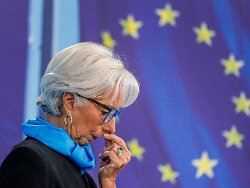Thursday, October 28, 2021
ECB remains in the role of observer
“Inflation, inflation, inflation”
The euro central bankers do nothing at first – but remain vigilant. High inflation is the dominant topic at both council meetings. ECB boss Lagarde gave delicate hints about the bond purchase program and the duration of the low interest rates.
Despite rapidly rising prices in Germany and throughout the euro area, the ECB is sticking to its very loose monetary policy. The ECB council headed by central bank chief Christine Lagarde is sticking to the zero interest rate and confirmed that its 1.85 trillion euros corona emergency program should run until at least March 2022. The aim of the bond purchases is a favorable financing environment for the economy affected by the pandemic.
A decision on the future of the program called PEPP is expected in mid-December when new forecasts for the economy and inflation are available. However, there is increasing evidence that it will actually end in March. “I currently expect the PEPP to end at the end of March,” said Lagarde. She cannot say whether the ECB will use the full volume. That will depend on the development of the financing conditions.
In addition, the central bank will not raise its interest rates as quickly as is currently factored into the financial markets. The conditions for an interest rate hike are unlikely to be in the timeframe expected by the markets, said Lagarde.
Will get better – or not
At the same time, she admitted that the unexpectedly sharp rise in inflation was the most important topic at the Council meeting. “We actually talked about inflation, inflation, inflation,” she said. However, after a thorough analysis, it was still believed that the rise in inflation was temporary. Over the course of the next year, however, the dominant factors are likely to weaken or drop out of the inflation calculation. However, the Council sees the risk that price pressure will last longer if the economic recovery should intensify or if the bottlenecks should last longer.
In the euro area, inflation has recently shot up at 3.4 percent, well above the ECB’s target of two percent. In Germany it was as much as 4.5 percent in October – the highest level in 28 years. However, the ECB expects the price pressure to subside next year, which it believes will primarily be caused by increased energy costs and pandemic-related disruptions in supply chains.
“The currently rising inflation expectations are a particularly strong argument for an end to the PEPP purchases in March 2022. The current economic slowdown will not change anything,” says ZEW economist Friedrich Heinemann. Chief economist Alexander Krüger from Bankhaus Lampe assumes that the ECB will continue to describe the rise in inflation as temporary and we show no monetary policy reaction: “A key rate hike is still a long way off.”
For the time being, the ECB left the key monetary policy rate at the record low of 0.0 percent, as expected by experts. The so-called deposit rate remains at minus 0.5 percent. This amounts to a penalty interest for hoarding money, which the banks have to shell out when parking excess funds at the central bank.
